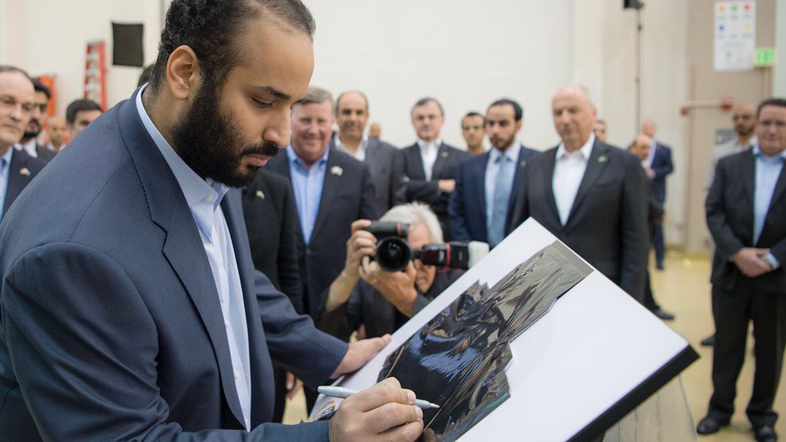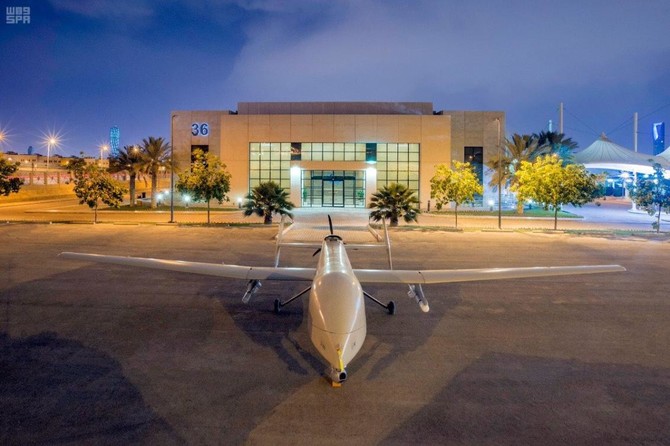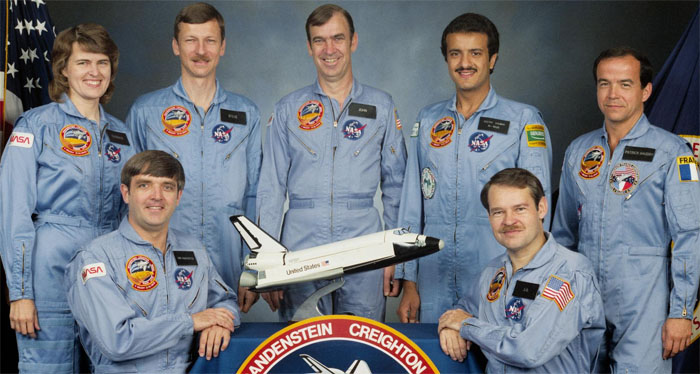In past centuries geo-political scientists agreed that if one wanted to control the world, one had to control the seas. Since the dawn of the 21st century, the new frontier of hegemony is space. Fulfilling such ambitions requires two prerequisites, namely efficiency in satellite manufacturing and extensive astronomical research. It is nevertheless necessary to gain a head start in both prerequisites since space exploration is a fast changing industry that needs an accelerated pace to meet its demands. Luckily, Saudi Arabia had its start since the mid-1980s, when in 1985 it launched its first satellite called Arabsat-1A. The satellite was manufactured by the Arabsat organisation, which itself was founded in 1976. The goal of the satellite was transmitting satellite communications and live television throughout the Arab world. Even though the satellite’s primary target was the Middle East, it was able to provide 10s of millions of people living in the Middle East, Africa, Europe and Central Asia with television and radio broadcasts and high definition TV channels. Saudi Arabia’s ambitions did not stop there, in the same year of Arabsat-1A’s launch Prince Sultan Bin Salman became the first Arab and Muslim astronaut to go to space when he joined a mission in the American space shuttle Discovery. This marked a new era in Saudi scientific exploration as the Kingdom continued to have successive astronomical breakthroughs such as the foundation of the King Abdulaziz City for Science and Technology (KACST), which founded The National Center for Remote Sensing Technology, an institute for space exploration. Later the Saudi government pledged a billion dollars in investment for its space services sector.
These developments ultimately lead to the establishment of the Saudi Space Agency, which was officially announced by King Salman’s royal decree on December 27, 2018. Furthermore, when King Salman ordered a reshuffling of his cabinet, he exempted Prince Sultan Bin Salman from his position as head of the Tourism Agency so that he could serve as the first head of the Saudi Space Agency.

This decision reflects the Saudi vision for the future in which it aims to be a leader in all fronts be they scientific or non-scientific, moreover it is part of the Saudi Vision 2030 plan in which the state aims to transform itself into a modern and futuristic state both regionally and globally. The aspects of Saudi Arabia’s space ambitions that comply with the Vision 2030 plan include:
First: The Saudi Space Agency - Goals and Advantages:
On April 25, 2016 King Salman bin Abdulaziz announced the Saudi Vision 2030 plan which aims to restructure the Saudi economy and develop its society. As such, this vision has included many ideas and theses which, in turn, have included countless specific projects, initiatives and implementation steps that have started to launch over the past months. During the last year or so, Saudi Arabia has been like a big workshop in which its engineers are fundamentally rebuilding the country’s economic structure and sectors from scratch following a detailed blueprint showing the Vision’s final goals. If Saudi Arabia wishes to fulfil its ambitions, then it is necessary that it also focuses on developing a space program which puts its efforts on the following strategic goals:
- Localizing the space industry as to have it keep up with Vision 2030
- Meeting different local demands
- Manufacturing and developing the latest Earth surveillance technologies
- Strengthening geographic information services
- Engaging the local commercial sector
- Promoting international cooperation in space exploration.
- Security and peace within space, establishing an international law of space through space exploration programs, moon exploration programs, space telecommunications programs and space technology programs.
Additionally, there are other goals that the space program strives for, namely:
- Saudi Arabia to play a role in the important international and regional space exploration missions.
- Exploiting space systems provided by other organizations in the space exploration industry.
- Enhancing the level of higher education in aerospace and training programs in the Kingdom, developing resources and paying attention to the aerospace sector.
- Promoting the spread and use of national air and space projects and services at the national level in the public sector, the industrial sector and the general public.
After achieving the above goals the Saudi space program will have a myriad of advantages which can be summarised through the following points:
- Advanced photovoltaic imaging systems
- High-speed communication systems
- Advanced lunar photography systems
- Processing and storing high-capacity data in space and transmitting it to earth stations via high-speed communications.

Second: The Futuristic Need for Satellites
It goes without saying that with each passing day, satellites grow more important for modern life. For one thing, satellites have a latent function of giving a country a political and economic advantage, which are necessary to maintain during times of peace. Furthermore, satellites have improved international telecommunications thus making the world a small village. Satellites have also enabled topographic photography, long-range weather forecasts and have made land, sea and air navigation easier.
Satellites also play a huge role in modern military warfare as many states’ strategic national defence sectors make great use of them. One disadvantage satellites have is that they are susceptible to hacking, which is one of the reasons scientists are doing their best to prevent any malicious interference with satellites. It is this growing importance that led Saudi Arabia to build and launch 13 efficient and advanced satellites during the last decade. Moreover, Saudi Arabia has established a center for moon and near earth object exploration, a collaborative project with NASA and a space and aviation research center in collaboration with Stanford University. Saudi Arabia is not only committed to launching satellites, but also manufacturing them. For instance, both the SAT 5A and SAT 5B are made entirely in Saudi Arabia by Saudi Arabian engineers in the King Abdulaziz City for Science and Technology.
Third: Saudi Arabia’s Space Technology Treaties
In recent years, Saudi Arabia has shown extensive commitments toward collaborative space exploration and technological advancements and has therefore signed a number of treaties and protocols highlighting that very commitment. Since joining in 2001, Saudi Arabia has been an important member of the Committee on the Peaceful Uses of Outer Space, which was set up by the United Nations Office for Outer Space Affairs. Additionally, Saudi Arabia has signed many conventions on outer space technologies and their rightful applications with big players in the space exploration field such as the United States, Russia, China, France and Germany as well as with other states. The most significant recent conventions that Saudi Arabia joined include:
- A bilateral cooperation agreement between Saudi Arabia and Kazakhstan in 2011. The aim was to exchange benefits and cooperation in the areas of space research, remote sensing, satellite communications, the exploration and use of outer space for peaceful purposes, the use of space infrastructure, the manufacture of spacecraft and their components and the provisions and use of launch services.
- A bilateral cooperation agreement between Saudi Arabia and China which was brokered by King Salman Bin Abdulaziz during his trip to China in March 16, 2017. This led to Saudi Arabia taking part in the Chinese space mission Chang’e-4, which was launched from Xichang on May 20, 2018 and reached the moon where satellite images were taken using Saudi photography systems.
- King Salman also signed an agreement during his Russia visit in October 2017, in which both countries agreed to deepen collaborative efforts in space exploration and the use of space for peaceful purposes. The agreement allowed Saudi participation in Russian space exploration in both manned and unmanned shuttles. The agreement also strengthened the Saudi Public Investment Fund's holdings in Virgin Galactic and Virgin Orbit by $ 1 billion as well as $ 480 million as an additional option in the future. These companies are supporting Saudi Arabia’s efforts to develop flight systems, low-cost satellite launch systems and space transport industries in the near future.
- An agreement between Saudi Arabia and Ukraine in which both states committed to increase collaboration in space research and use of outer space for peaceful purposes.
Fourth: Female Participation in the Saudi Space Program
One of the commitments that Saudi Arabia strived for was increasing female participation in its space exploration and research efforts. Maged El Moshary, the head of the National Center of Satellite Manufacturing of the King Abdulaziz City for Science and Technology (KACST), noted that Saudi women play a large role in the satellite industry. For example, the National Center currently employs 35 women who work in several areas such as optics engineering, development of image processing systems and moon mission planning systems. It is worth noting that such efforts comply with Vision 2030 plans which emphasize an improvement of human resources, including greater participation of women in the development of Saudi economy and society. El Moshary also mentioned how establishing a female department within the Center helped give women the opportunity to take part in scientific breakthroughs and research. Moreover, KACST’s collaborations with reputable academic institutions such as Stanford gave both Saudi women and men the opportunity to take part in new and exciting scientific endeavors.

Fifth: The Important Role of the New Saudi Space Agency
King Salman’s announcement on December 27, 2018 of the establishment of the Saudi Space Agency marked a new beginning of Saudi space exploration and innovation. For one thing, there will now be a central organisation in which all the established industries will collaborate with, thus creating greater synchronization of Saudi space ambitions and research. The new agency will also contribute to diversifying the Saudi economy, improving the country’s technological and scientific efforts as well as making it both a regional and global leader in space exploration. It is for this reason that many have suggested that the state annually celebrates the 27th of December as National Saudi Space Day, just as the international community celebrates April 12, the day in which Vostok 1, the first manned space mission took place, as International Space Day.








